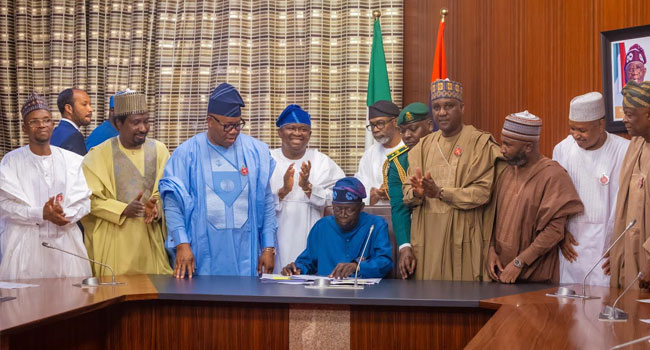The President, Bola Ahmed Tinubu recently signed the N28.78 trillion 2024 Budget into law at the State House, Abuja after it had been passed by the National Assembly on Saturday.
The ceremony was witnessed by the President of the Senate, Senator Godswill Akpabio, and the Speaker of the House of Representatives, Hon Tajudeen Abbas.

The Minister of Finance and Coordinating Minister of the Economy, Mr Wale Edun; Minister of Budget and Economic Planning, Alhaji Atiku Bagudu; and the National Security Adviser (NSA), Malam Nuhu Ribadu were also in attendance.

Also on the ground were the Chief of Staff to the President, Femi Gbajabiamila; the National Chairman of the ruling All Progressives Congress (APC), Dr Abdullahi Ganduje; Chairman of the Senate Appropriation Committee, Senator Olamilekan Adeola, among others.
The parliament increased the budget submitted by President Bola Tinubu by the sum of N1.2 trillion.
The allocations to various Ministries Departments and Agencies (MDAs) has the Ministry of Defence recording the highest allocation of N1.3tn.This is followed by the Ministry of Police Affairs with N869.121bn.

The Ministry of Education got N857.134bn, the Ministry of Health and Social Welfare – N667.577bn and the Ministry of Interior – N362.552bn respectively.
The Ministry of Youths –N201.467bn, Office of the National Security Adviser –N199.763bn, Ministry of Foreign Affairs – N140.456bn.The Ministry of Agriculture and Food Security – N110.248bn.
The Office of the Secretary to the Government of the Federation – N100.248bn and the Presidency – N97.913bn.
A careful study of the 2024 budget seems to be more concentrated on political satisfaction than a people driven budget.
For instance, the National Assembly despite the outcries by the masses on the social media expectedly took good care of themselves. They ensured that a truly grand car park is provided for in the Budget Estimates for 2024. They need to have a car park that befits their status as federal lawmakers even if the constituents that supposedly sent them to Abuja are dying of hunger and starvation
Can you imagine that the National Assembly car parks and recreation centre will cost the taxpayers N10 billion, a sum that the country can ill-afford at this time. The federal lawmakers allocated N4billion for the National Assembly Recreation Centre; N4billion for the design, construction, furnishing and equipping of the National Assembly’s Budget and Research Office; N3billion for procurement of books for the National Assembly Library; N3billion Senate car park; N3billion for the House of Representatives car park; N3billion for the upgrade of key infrastructure in the National Assembly; and N3billion for the design, construction, furnishing and equipping of the assembly’s ultramodern printing press; N2.7billion for furnishing of committee meeting rooms and other offices within Senate building.
Sadly, it is not only the National Assembly that is the beneficiary of some highly ostentatious items in their budget, this is in spite of the dire state of the Nigerian citizen.
The budget by ministries and parastatals were also largely about taking care of those in power at the detriment of the people. A few such items readily come to mind when one takes a closer look at the budget. For instance, at a time, we are told that government has no business being in business, the Federal Ministry of Solid Minerals Development has proposed a budget of N2.38billion for the establishment of a Nigerian Solid Minerals Company Limited at the ministry’s headquarters.
This is in spite of the fact that most businesses set up by the Nigerian government have always failed and woefully too. It is not in doubt that it is difficult for any government to run a successful company in this country. The private sector should drive the diversification of the solid minerals sector. Therefore, the allocation of N2.38 billion for purposes of setting up a government owned company is certainly not well thought out.
In the 2024 budget N1.44 trillion was allocated to the education sector. As huge as this may appear at a glance, this was less than the required UNESCO benchmark which recommended that 25 percent of the national budget spent on education would do the education sector of developing countries a lot of good. Thirty-four years after the United Nations Educational, Scientific and Cultural Organisation, UNESCO, recommended that developing nations give up to 25 percent of their annual budget to public education, Nigeria’s allocation to the sector remains still less than 10 per cent.
Consequently, of the N55.3 trillion allocated to the education sector by the federal government between 2016-2021, only N3.5 trillion had been given to the sector, and this represents less than 10 percent. In comparison, though Ghana and South Africa have not actually met up to the recommended 25 percent by UNESCO, they have done far more than Nigeria, allocating a maximum 23 percent and 16.7 percent respectively. In 2016, of the total budget of N6.06 trn, the sum of N369.6 billion or 6.7 percent of the budget was allocated to public education in the country. In 2017, N550 bn or 7.38 percent was allocated to education out of N7.29 trn budget, while in 2018, N605.8 bn or 7.04 percent was given to education out of N9.2 trn budget. In 2019, N620 bn or 7.05 percent was allocated to education out of the budget of N8.92 trn, while in 2020, N671.07 bn or 6.7 percent was given to education out of N10.33 trn budget. In 2021, N742.5 bn or 5.6 percent was allocated to education out of a budget of N13.6 trn.
On the other hand, according to reports by the World Bank, Ghana allocated 23.81 percent of its national budget for education in 2015, 22.09 percent in 2016, 20.1 percent in 2017 and 18.6 percent in 2018. For South Africa, it has kept increasing allocations to the education sector from R246 billion or 16.7 percent in 2018, R310 billion in 2019, R 387 billion in 2020 and projected that it’ll hit R416 billion by 2023/24.
Here we are in 2024, under the Renewed Hope Agenda of President Bola Tinubu we are still allocating less than 10 percent of our annual budget for education. Albert Einstein defined insanity as doing the same thing over and over and expecting different results.
If we can remove all the unnecessary allocations and channel them to education, we could be able to meet the UNESCO target, and thus, use education to overcome the poverty ravaging the country. Again, the federal government has failed for the umpteenth time to meet the Abuja Declaration by African leaders in 2001 and the World Health Organisation (WHO) benchmark to allocate, at least, 15 percent of yearly national budgets to health. In April 2001, the African Union (AU) countries met in Abuja and set a target of, at least, 15 percent of their yearly budget to improve the health sector.
Also, in the budget of the Federal Ministry of Finance, there is an item in the budget described as “Investment in Digital and Creative Enterprises (DICE) Training of entrepreneurs in creativity and digital technology- ministry headquarters.” This nebulous subhead is allocated a whopping sum of N45.50billion. Going down a bit on the Finance Budget, you see a similar item identified as “Investment in Digital and Creative Enterprises (DICE) Training of Entrepreneurs in Creativity and Digital Technology-Ministry headquarters,” this has the budget sum of N18.38billion. What could be the differences between the two items?
The Budget of a country is a serious business, those who prepare it and those who scrutinise it for passage into law must act in the best interest of the people, not on the whims and needs of politicians. The 2024 budget did not prioritise the people. That was clearly expressed by the budgetary allocations to the health and education sectors by this administration.
When one reads through the budget document, the signal one gets is that the government says one thing but intends to do another. When you juxtapose the budget with the New Year Address of Mr President, there is a wide disparity. The Renewed Hope Agenda is supposedly anchored on the people, but the 2024 Budget as passed is full of barrels of pork that will benefit only the politicians and those in the corridors of power. Therefore, this is not the kind of budget Nigeria needs at this time. We need a budget that is truly citizen centred.
Revenue projections have generally been ambitious and often unmet, even in aggregate. The impact of such projections is troubling as budget implementation is principally based on the revenue the government can raise. With net oil revenue falling on average in the last three years, serving as a generally unreliable source of government revenue, the Nigerian government’s focus should be directed beyond customs revenues and value-added taxes. It has been argued that collecting these taxes (still suboptimal in Nigeria) does not demonstrate state capacity and strength. The budget needs revenue projections aligned with fiscal realities, which must be done realistically and pragmatically. Best practice advises revenue projections to be “underestimated, than overestimated.”
The service-wide vote, established as a contingency fund to address unforeseen circumstances and events, has increased exponentially in recent years from N198.95 billion (2.18 percent of the budget) in 2018 to N757.19 billion (5.54 percent of the budget) in 2021 and more recently to N4.41 trillion (16.03 percent of the budget) in 2024. In addition, the service-wide vote provision contains budget lines that should be captured within MDAs’ budget and vague budget lines that create loopholes for impropriety and/or corruption. For example, the service-wide vote envelope in the 2024 appropriation bill contains N108 billion for “special projects” with the project code “ERGP9213044.” To worsen the situation, the federal government budget implementation reports often contain no information on how service-wide votes are utilized.
The budget, which is the most important government policy instrument, should and must be tailored towards stimulating broad-based economic growth, reducing inequality and poverty, addressing insecurity and Nigeria’s infrastructure gap, and developing human capital.

